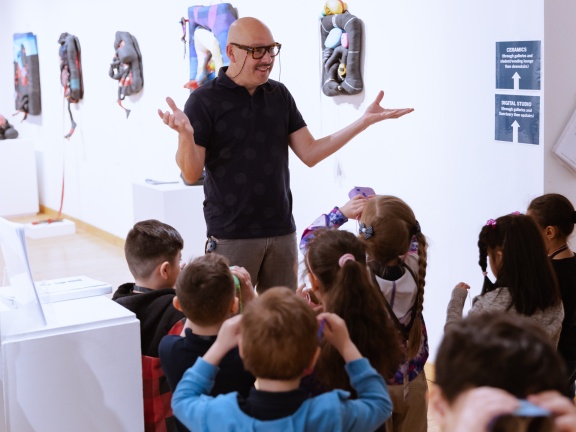
Background
Teaching artists have an essential function in the arts education ecosystem. They hold a dynamic, dual role as artist and educator. This position allows them to teach artistic skills that help young people thrive in school and life, developing social-emotional and critical thinking skills and building empathy and connections to others and the world around them. Additionally, their own skills and backgrounds as artists allows them to share their artistic practice, connecting students to the larger cultural community.
In the 2011 report on the Teaching Artist Research Project by Nick Rabkin of NORC at the University of Chicago, he traces the origins of the role of the teaching artist to Hull House in Chicago. Rabkin explains the settlement house movement, of which Hull House was a part, “saw the arts as essential to weaving the fabric of strong communities…that learning the arts cultivates the agency and voice required to participate in a democratic society, where everyone has the right to be heard and contribute to the culture.”[3] Rabkin goes on to describe how this orientation informed a new approach to how the arts were taught. These early settlement house art teachers moved away from the model that arts learning was only about excellence, artistic skill, and cultivating talent, and toward an appreciation for the equally essential role arts education can play in building creativity, deepening connection to one’s community, and developing voice and civic engagement.
Thoughtfully designed and delivered arts education can act as a safe space, allowing young people to share personal stories, process conflict and trauma, and develop interpersonal and cultural awareness. Implementing high-quality programs that can support young people in this growth and development are reliant on well-trained, well-resourced, and well-supported teaching artists who do this complex and multilayered work. As a community of practitioners who are often employed contractually and have fewer professional development resources than other types of workers, this objective and related funding seek to provide valuable network-building and skills development.
Opportunity Overview
WPF aims to support projects and programs that connect more teaching artists in the Philadelphia region to high-quality professional development, network-building, and learning experiences. In particular, we are most interested in prioritizing projects that build a community of practice around the goal of ensuring hands-on arts learning is made accessible to youth using supportive and inclusive practices. Training and skill development should be focused on behaviors that can be applied broadly to develop trauma-informed teaching practices that advance creative, social, and developmental outcomes.
Proposals must include activities that do the following:
- Provide free or low-cost professional development and training opportunities that support ongoing skills development that can be put into practice in existing or upcoming (next six months) teaching opportunities.
- Build networks of practitioners that allow teaching artists to be part of an ongoing learning cohort to share resources and expertise with other teaching artists.
Please note, under this RFP, the Foundation will not consider a proposal to support the following:
- Fully asynchronous virtual training without any individualized instruction or opportunities to engage with and ask questions of instructors.
- Training that focuses only on building skills for a specific tool or technology (e.g., a class on Adobe products or editing software).
- Training that happens during a single session.
- Training/programs for individuals other than active teaching artists with a history of employment as teaching artists.
- Training offered by an arts education program to only its teaching artists and/or skill building and training that is only applicable to a single arts education program and its model.
We are requesting proposals for one- to two-year projects that will increase opportunities for teaching artists across the region to engage with a range of high-quality network building and learning experiences. After reviewing proposals, WPF will conduct site visits and gather additional information from a limited number of applicants.
Applicants that propose projects in partnership with other applicants will be considered on their individual merits. The Foundation recognizes that making significant progress on the objective is difficult and values partnerships that leverage complementary strengths, resources, and expertise for the mutual benefit of the applicants and their communities.
Furthermore, the Foundation recognizes that there are many different tactics or approaches that could be used to advance the objective stated above. All proposals that meet the review criteria and additional considerations described below are encouraged.
WPF has a total of $1 million available to advance this objective at this time. WPF values diverse approaches from various organizations and communities to address the objective. We aim to attract and fund a range of projects. There is no minimum or maximum amount of funding that projects may request but the most competitive proposals will likely be those with total grant requests under $200,000 over two years. The grant amount requested should be proportionate to the scope of the project and the contribution that the project will make to the overall objective.
Full Request for Proposals (RFP) and Application
Download the full RFP packet for more information about this opportunity including eligibility, review criteria, learning and evaluation, budget, and link to an application template.
All applications must be submitted through the Grants Portal.
Webinar
An informational webinar took place on December 12, 2024, with the recording available below: